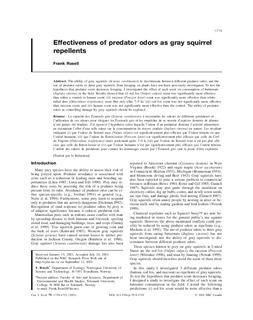| dc.contributor.author | Rosell, Frank | |
| dc.date.accessioned | 2007-02-07T10:10:43Z | |
| dc.date.accessioned | 2017-04-19T12:24:52Z | |
| dc.date.available | 2007-02-07T10:10:43Z | |
| dc.date.available | 2017-04-19T12:24:52Z | |
| dc.date.issued | 2001 | |
| dc.identifier.citation | Canadian journal of zoology 79 (2001), No. 9, p. 1719-1723 | |
| dc.identifier.issn | 0008-4301 | |
| dc.identifier.uri | http://hdl.handle.net/11250/2437998 | |
| dc.description.abstract | The ability of gray squirrels (Sciurus carolinensis) to discriminate between different predator odors and the use of predator odors to deter gray squirrels from foraging on plants have not been previously investigated. To test the hypothesis that predator scent decreases foraging, I investigated the effect of such scent on consumption of butternuts (Juglans cinerea) in the field. Results showed that (i) red fox (Vulpes vulpes) scent was significantly more effective than either a control or human scent; (ii) raccoon (Procyon lotor) scent was significantly more effective than white-tailed deer (Odocoileus virginianus) scent (but only after 7–9 h); (iii) red fox scent was not significantly more effective than raccoon scent; and (iv) human scent was not significantly more effective than the control. The utility of predator odors in controlling damage by gray squirrels should be explored. | |
| dc.format.extent | 59874 bytes | |
| dc.format.mimetype | application/pdf | |
| dc.language.iso | eng | |
| dc.subject | Odors | |
| dc.subject | Predators | |
| dc.subject | Squirrels | |
| dc.subject | Foraging | |
| dc.title | Effectiveness of predator odors as gray squirrel repellents | |
| dc.type | Journal article | |
| dc.type | Peer reviewed | |
| dc.subject.nsi | 485 | |
| dc.identifier.doi | http://dx.doi.org/10.1139/cjz-79-9-1719 | |
